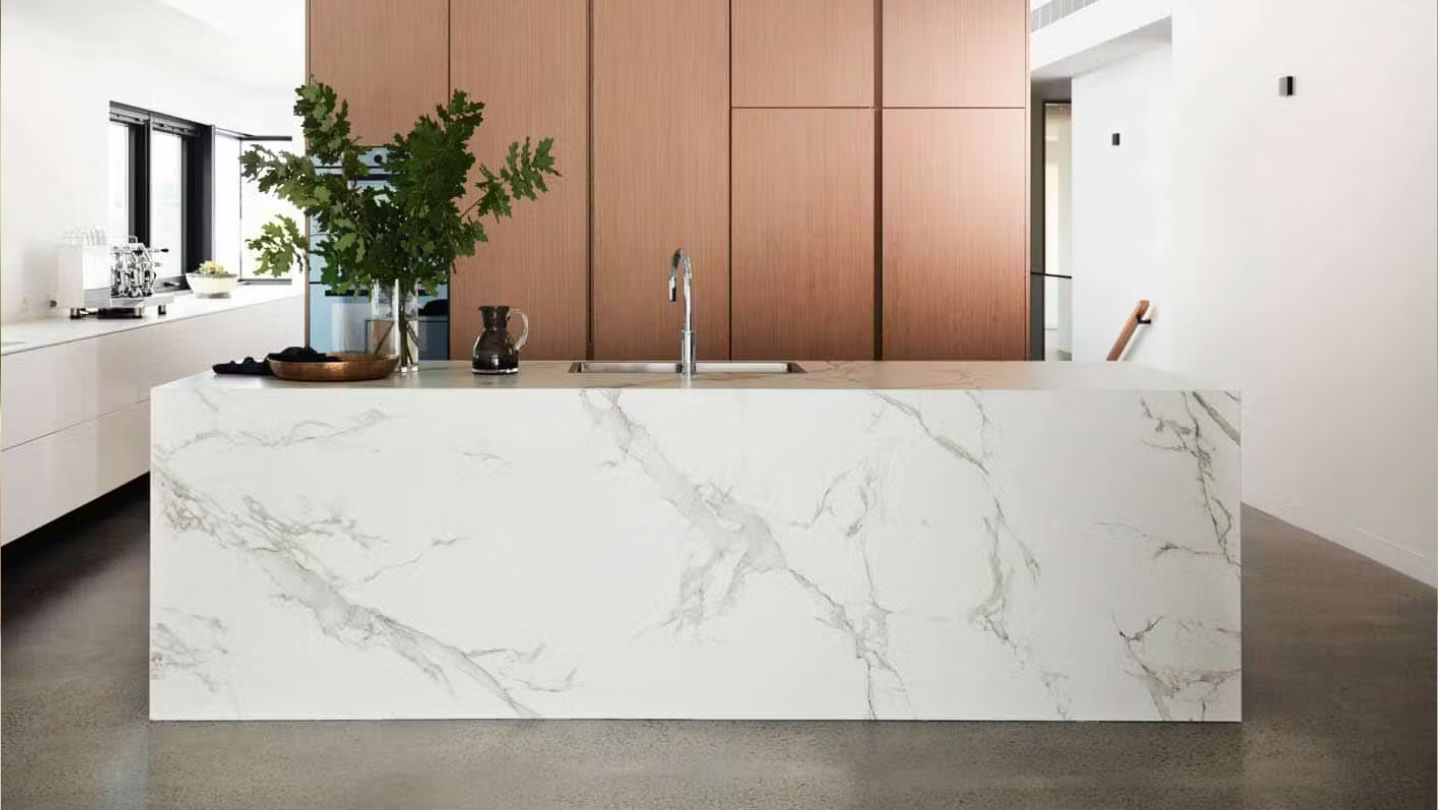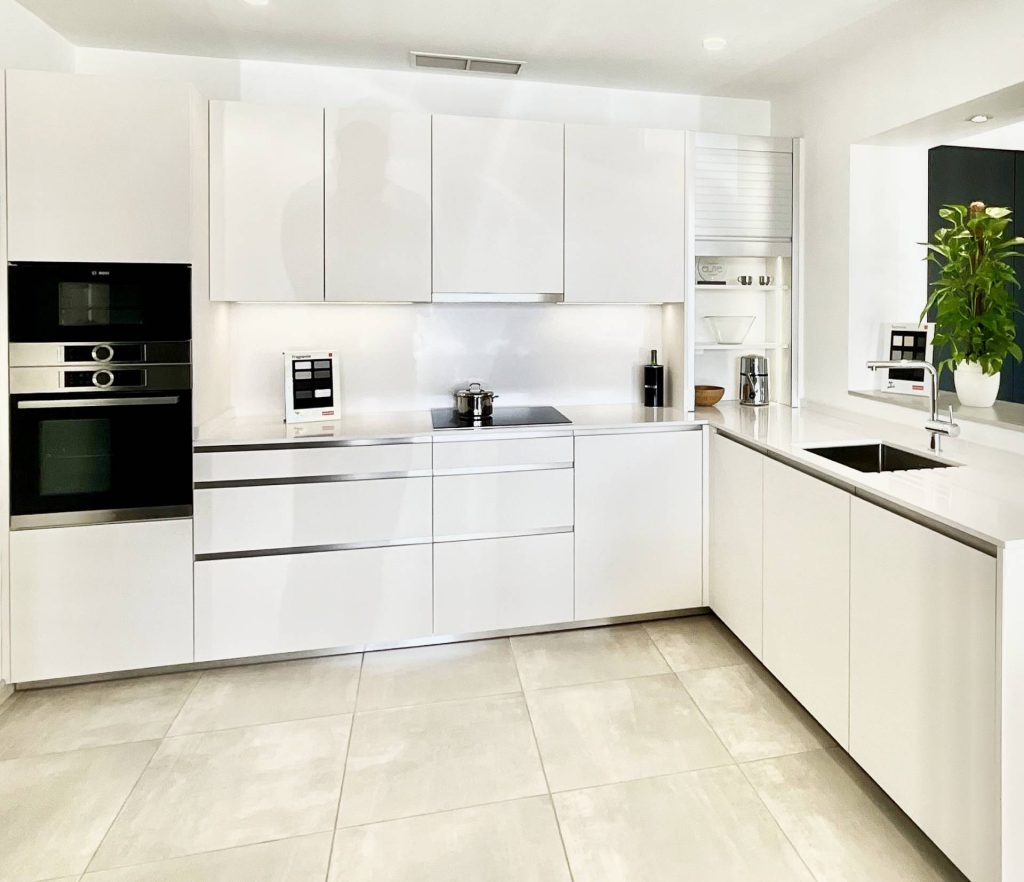
If you want to renovate your kitchen with quality materials that are hard-wearing and require little maintenance, porcelain worktops could be the solution you are looking for. With their combination of durability, versatility and aesthetics, these worktops offer an attractive option for any culinary space.
In this article, we explain in detail the advantages and applications of porcelain in domestic and professional kitchens. From its stain resistance to its ability to mimic other materials with precision, you’ll discover why porcelain worktops are gaining popularity among interior design enthusiasts and kitchen aficionados.
If you want to enjoy personalised advice and a tailor-made quote, the best thing to do is to visit our kitchen shop in Estepona.
Discover Porcelain, a versatile material for your kitchen
When it comes to choosing the right material for kitchen worktops, porcelain emerges as an innovative and highly versatile option. This material, developed by brands such as Dekton or Neolith, is widely used in the construction and interior design industry. It offers a unique combination of durability, aesthetics and functionality.
So why not use it in the kitchen?
Porcelain is a type of ceramic made from a mixture of clays, feldspar and other minerals, which is pressed and fired at high temperatures. This manufacturing process results in a solid, hard-wearing, high-density surface, which has a wide range of benefits for use in kitchen worktops.
Why is it a versatile material?
Porcelain gives interior designers a lot of scope, as it can be used on many different surfaces and can imitate other materials such as wood. Here are some of the most common applications of porcelain in kitchens:
- Kitchen worktops: The most common application of porcelain is as a material for kitchen worktops. Its durability, stain resistance and wide variety of designs make it ideal for this purpose. Whether in residential or commercial kitchens, porcelain offers a hard-wearing surface, with wide surfaces that minimise joints and easy maintenance for food preparation and cooking.
- Kitchen islands: Kitchen islands are a central element in many modern kitchen designs, and porcelain is a popular choice for cladding kitchen island worktops. Its strength and aesthetic options make it perfect for withstanding daily use and creating a beautiful additional work area.
- Breakfast bars: These are a popular feature in many contemporary kitchens, and porcelain can be used to clad the worktops in these areas. Its heat and stain resistance make it well suited to this informal dining area.
- Side tables: In addition to worktops, porcelain can also be used to make side tables or worktops in the kitchen. There you can cut, chop, prepare food or place hot containers on them without fear of damaging the surface.
- Backsplashes: It is also commonly used as a kitchen backsplash material. Its ability to mimic other materials, such as stone or marble, creates a cohesive and elegant look throughout the kitchen and at the same time makes it much easier to clean.
Characteristics of porcelain worktop material
We’ve mentioned them before, so let’s not beat around the bush. These are the main advantages of porcelain material for kitchen worktops:
- Exceptional durability: Porcelain is known for its high strength and durability. It is an extremely hard material that can withstand daily use, resist scratches and knocks, and maintain its appearance for many years without deteriorating.
- Stain resistance: Porcelain worktops are highly resistant to stains and liquid absorption. This makes them ideal for kitchens where food is prepared and liquids are frequently handled, as they are easy to clean and maintain.
- Variety of designs and finishes: Porcelain offers a wide variety of designs, patterns and finishes that can mimic the appearance of other natural materials, such as stone or wood, with impressive precision. This gives homeowners the possibility to choose the look that best suits the style of their kitchen.
- Heat and moisture resistance: Porcelain is a non-porous material that is resistant to heat and moisture, making it suitable for use in kitchen environments. It can withstand extreme temperatures without deformation or damage, and its surface is unaffected by exposure to water.
- Easy maintenance: Porcelain worktops are easy to clean and maintain. They do not require periodic sealing like other surfaces, and can simply be cleaned with soap and water to maintain their original shine and appearance.
- Environmentally friendly: Porcelain is a material made from natural resources and is recyclable at the end of its useful life. In addition, its durability helps to reduce the need for replacement, making it an environmentally friendly choice for kitchen worktops.
What more could you ask for? In a simply spectacular option that combines personalised design, strength and durability. If you want to discover all the options available, we invite you to visit our kitchen showroom in Estepona.
If you already have it clear, now all you need is a customised quote. Come and meet us, to solve any doubts you may have and to explore our kitchen showroom, we are waiting for you.
